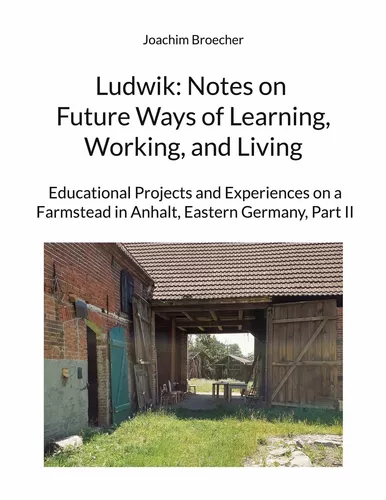Skip to the end of the images gallery Navigation umschalten
Skip to the beginning of the images gallery Navigation umschalten

Ludwik: Notes on Future Ways of Learning, Working, and Living
Educational Projects and Experiences on a Farmstead in Anhalt, Eastern Germany, Part II
Gesellschaft, Politik & Medien
ePUB
33,2 MB
DRM: Wasserzeichen
ISBN-13: 9783756831951
Verlag: Books on Demand
Erscheinungsdatum: 11.09.2023
Sprache: Englisch
Barrierefreiheit: Eingeschränkt zugänglich
erhältlich als:
9,99 €
inkl. MwSt.
sofort verfügbar als Download
Du schreibst?
Erfüll dir deinen Traum, schreibe deine Geschichte und mach mit BoD ein Buch daraus!
Mehr InfosYoung people who say goodbye to school education because they do not feel addressed by the learning forms and structures there. Many no longer even learn the absolute basics. Learning groups in daycare centers and schools overloaded with social problems. Shortage of skilled workers in educational institutions and in the care of the elderly. Alienation of many adults in functionalist professional life. Fragmentation of society. Social isolation of individuals. Compensatory life in digital parallel worlds.
If we had an unconditional basic income for everyone, including the middle class that generates the tax revenue, in the sense of an incentive to act entrepreneurially and to assume social responsibility, if we converted compulsory schooling into compulsory self-designed education, and if Germany were to come to terms with a sensible migration policy, then people could get together and buy the vacant real estate in eastern Germany and turn it into vibrant craft, technical or agricultural projects, including in other parts of the country and in the cities. Young people would be able to move from project to project, wandering around, learning on their own. Children would grow up with several caregivers, a broader range of male and female role models, and professional profiles, which would benefit their development.
People would then do a lot of things themselves again and help each other in the communities, from caring for small children, to pedagogical work with older children, parallel to the schools and day care centers that continue to exist but have become fewer in number, to the integration and care of the elderly. Vocational schools and universities could make entrance exams for those who learn in their own projects. A lot of driving would be eliminated, which would also be good for the climate. Deceleration would occur, people would have more time for each other and would be healthier. What we need is a different social structure and a philosophy from which identity-promoting and socially cohesive narratives can emerge anew. This second documentary volume shows what the status is, in the further development of a three-sided farm from 1884, located in Anhalt, into a think tank and in the creation of the first cultural and educational references.
If we had an unconditional basic income for everyone, including the middle class that generates the tax revenue, in the sense of an incentive to act entrepreneurially and to assume social responsibility, if we converted compulsory schooling into compulsory self-designed education, and if Germany were to come to terms with a sensible migration policy, then people could get together and buy the vacant real estate in eastern Germany and turn it into vibrant craft, technical or agricultural projects, including in other parts of the country and in the cities. Young people would be able to move from project to project, wandering around, learning on their own. Children would grow up with several caregivers, a broader range of male and female role models, and professional profiles, which would benefit their development.
People would then do a lot of things themselves again and help each other in the communities, from caring for small children, to pedagogical work with older children, parallel to the schools and day care centers that continue to exist but have become fewer in number, to the integration and care of the elderly. Vocational schools and universities could make entrance exams for those who learn in their own projects. A lot of driving would be eliminated, which would also be good for the climate. Deceleration would occur, people would have more time for each other and would be healthier. What we need is a different social structure and a philosophy from which identity-promoting and socially cohesive narratives can emerge anew. This second documentary volume shows what the status is, in the further development of a three-sided farm from 1884, located in Anhalt, into a think tank and in the creation of the first cultural and educational references.
Eigene Bewertung schreiben






Es sind momentan noch keine Pressestimmen vorhanden.